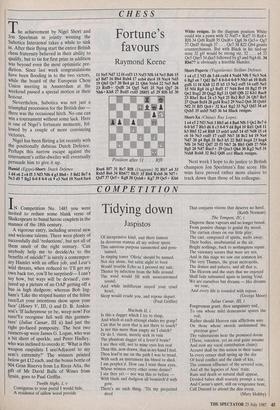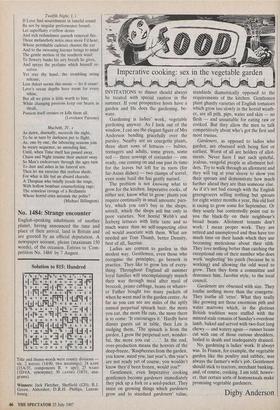COMPETITION
Tidying down
Jaspistos
IN Competition No. 1481 you were invited to reduce some blank verse of Shakespeare to banal heroic couplets in the manner of the 18th century.
A vigorous entry, including several new and welcome talents. There were plenty of successfully dull 'reductions', but not all of them smelt of the right century. 'Can anybody help me to decide/As to the benefits of suicide?' is surely a contempor- ary Hamlet with an office job, and Lear's Wild threats, when reduced to 'I'll get my own back too, you'll be surprised/— I can't say how, but ways will be devised', con- jured up a picture of an OAP getting off a bus in high dudgeon; whereas Bob Ing- ham's 'Like the striped hunter of the feline race/Let your intentions show upon your face' (Henry V, III, i) and D. B. Jenkin- son's 'If lachrymose ye be, weep now! For sure/Ye recognise full well this garmen- ture' (Julius Caesar, III ii) had just the right po-faced pomposity. The best two runners-up were James G. Logan, who was a bit short of sparkle, and Peter Hadley, who was inclined to overdo it: 'What is this weapon cuspidate I see/Adjacent to my arm's extremity?' The winners printed below get £12 each, and the bonus bottle of 904 Gran Riserva from La Rioja Alta, the gift of Mr David Balls of Wines from Spain, goes to Paul Griffin.
Twefth Night, I, v Contiguous to your portal I would bide, A residence of sallow wood provide Of inexpensive kind, and there lament In decorous stanzas all my ardour spent.
This amorous purpose summoned and proc- laimed,
In ringing tones 'Olivia' should be named. Not day alone, but sable night to boot Would trouble Echo as I pressed my suit; Thence by infection from the hills around The wind would fill with unaccustomed
sound; And while indifferent stayed your cruel heart, Sleep would evade you, and repose depart.
(Paul Griffin) Macbeth II, Is this a dagger which I try to clasp, And which at each attempt eludes my grasp? Can that be seen that is not there to touch? Is not this more than empty air I clutch? Or do I, vision, merely seek in vain The phantom dagger of a fever'd brain?
see thee still, not to mine eyes less real Than this, now drawn, that in my hand I feel. Thou lead'st me on the path I was to tread, With such an instrument his blood to shed. I am perplex'd. How can I trust these eyes, Whose witness every other sense denies? I see thee yet — nor was this so before With blade and dudgeon all besmirch'd with
gore.
There's no such thing. 'Tis my projected deed That conjures visions that deserve no heed.
(Keith Norman) The Tempest, IV, i Disperse these vapours and no longer brood. From pensive change to genial thy mood. The curtain closes on our little play; The cast, composed of spirits, melts away; Their bodies, insubstantial as the air, Bright nothings, back to nothingness repair. The visionary scenes that were are not, And in this stage we saw our common lot. The very Thames, the great metropolis, The domes and palaces, and all that is, The Heaven and the stars that we enjoyed Shall fade subsumed again in lasting Void. We are ourselves but dreams — like dreams we rose, And every life is rounded with repose.
(George Moor) Julius Caesar, III, i Forgiveness grant, thou sanguinary sod, To one whose mild demeanour spares the rod; Rather should Heaven rain afflictions sore On those whose swords undammed the precious gore! Thy vulnerations hear the promised doom (These, voiceless, yet an oral guise assume And now my vocal contribution claim): Accurst shall be this nation in their name! In every corner shall spring up the din Of local conflict and the clash of kin, The crimson effluence of the severed vein, And all the legacies of Ares' train; Ruin and death so natural shall appear, Divided babes shall scarcely prompt a tear; And Caesar's spirit, still on vengeance bent, Call Discord to attend the dire event.
(Mary Holtby) Twelfth Night, I, i If Love find nourishment in tuneful sound Be not by singular performance bound; Let superfluity o'erflow desire And rich redundance quench venereal fire. Those melancholy notes once more I'd hear, Whose perishable cadence charms the ear And to the swooning listener brings to mind The gentle motion of the southern wind: To flowery banks his airy breath he gives, And sprays the perfume which himself re- ceives.
Yet stay thy hand, the trembling string release; Less dulcet seems this music — let it cease! Love's ocean depths have room for every whim, But all we prize is little worth to him; While changing passions keep our hearts in thrall, Passion itself creates or kills them all.
(Loveknot Parsons)
Macbeth, IV, v
As dawn, diurnally, succeeds the night, To be in turn by darkness put to flight, As, one by one, the labouring seasons join In weary sequence, an unending line, Until, when Time itself has passed away, Chaos and Night resume their ancient sway. So Man's endeavours through the ages turn To dust and ashes in his funeral urn. Then let me exorcise this restless shade, For what is life but an absurd charade; A Thespian who briefly treads the stage, With hollow bombast counterfeiting rage; The senseless ravings of a Bedlamite Whose horrid cries astonish the polite?
(Michael Billington)



















































 Previous page
Previous page